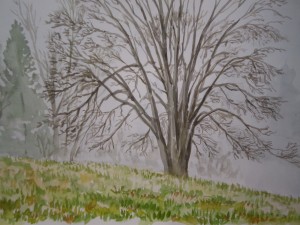II. Steps Toward Personal Moral Action
 In Part 1, I provided a rough yardstick for measuring the morality of actions: “If I conscientiously keep myself informed, and, in those cases where my decisions result in actions that have an impact on the world at large, however small, strive to make those decisions in such a way that net benefit to all concerned is maximized and net harm to all concerned is minimized, I am acting as a moral person, and my conscience is clear.” The following are some rough guidelines I follow to try to achieve that end. It is not an exhaustive list; certainly, a person in different life circumstances who reflects on the general principle will be able to come up with equally useful ideas suited to his or her particular temperament and position in life.
In Part 1, I provided a rough yardstick for measuring the morality of actions: “If I conscientiously keep myself informed, and, in those cases where my decisions result in actions that have an impact on the world at large, however small, strive to make those decisions in such a way that net benefit to all concerned is maximized and net harm to all concerned is minimized, I am acting as a moral person, and my conscience is clear.” The following are some rough guidelines I follow to try to achieve that end. It is not an exhaustive list; certainly, a person in different life circumstances who reflects on the general principle will be able to come up with equally useful ideas suited to his or her particular temperament and position in life.
*Voluntary simplicity. Much of what is objectionable in American domestic and foreign policy is fuelled by over-consumption and consumption without regard to the moral aspects of production. Virtually anybody can become a vegetarian, or cease using his car when public transportation or going on foot is possible (to give two obvious examples). If a substantial portion of the American population adopted these two simple, perfectly legal measures, the effect on world markets would be quite dramatic, and the damage done to corporate predators rather in excess of any individual act of terrorism I can envision. One person isn’t going to change the world. However, in the case of a connected person – a person who has his tribe of 50-150 individuals who acknowledge and respect him – others are likely to follow his example, not because they have been coerced or even exhorted, but because they see the model and are persuaded by example to emulate it.
*Concentrating efforts where they will have the most effect, which is generally on a local level. As a corollary of this, I try to resist the temptation to relinquish autonomy – either my own personal autonomy, or that of a small organization of which I am a part – to some larger entity, no matter how benevolent that entity may at first appear, or how advantageous the association initially seems. Once one has sacrificed the autonomy of the “tribal” group to an entity which is not directly responsible to the people it serves, the door is open to manipulation by non-benevolent interests. For this reason I generally avoid organizations which rely heavily on government grants, United Way or any of the causes which are conspicuously associated with it, and anything which appears to be inordinately under the influence of a single corporate donor. This of course leaves out most conspicuous causes, and indeed, unless one is a highly connected person with a strong social identity, unobjectionable avenues for contribution may be difficult to identify. It is then tempting to fall into despondency and cease attempting to better the world altogether.
*Prayer and meditation. I am a religious person, and I do believe that prayers addressed to a supernatural Higher Power have an effect. Generally, I don’t approach prayer as a request for a certain outcome, X, but rather, as a request for the insight to see where, amidst all the noise and confusion of the world, creation is progressing (i.e., is there any hope at all in all this mess, and if so, where?) and for guidance in making my own personal decisions so that they are concordant with God’s plan. Obviously one can’t demonstrate scientifically whether prayers so general and open-ended are answered or not. To the extent that my personal serenity and effectiveness as a citizen of the planet have been bolstered, they certainly have.
 *Creating. I was born with an almost overwhelming urge to create things, which over time succumbed to discouragement and frustration because I could never find an audience. Possibly most of what I create really has little value, but it is not entirely worthless, and it would not exist unless I had made the effort. Very likely, if by some miracle something I had created (paintings, poetry, clothing design, novels, essays, scientific monographs, etc.) had proved a commercial success, I would now be a major player in a culture with which I would prefer not to be associated.
*Creating. I was born with an almost overwhelming urge to create things, which over time succumbed to discouragement and frustration because I could never find an audience. Possibly most of what I create really has little value, but it is not entirely worthless, and it would not exist unless I had made the effort. Very likely, if by some miracle something I had created (paintings, poetry, clothing design, novels, essays, scientific monographs, etc.) had proved a commercial success, I would now be a major player in a culture with which I would prefer not to be associated.
I know that as a citizen I cannot escape entirely from penalties arising from wrongdoing by the people who represent me, no matter how little I have personally been a participant in the wrongdoing. Unfortunately, in a hierarchical structure, everyone shares in the costs, and those costs are not necessarily apportioned with respect to the amount of responsibility involved. If I am on the winning side, those penalties will consist mainly of the inevitable and predictable results of the laws of nature. For example, if my country spends money it doesn’t have on a protracted, unnecessary war which doesn’t pay for itself, the result is going to be runaway inflation, skyrocketing taxation, or drastic curtailment of other government services upon which people are dependent, all of which will adversely affect my personal lifestyle. If, however, I am on the losing side, I may also be subjected to punitive penalties for violating the victor’s code of laws.
What I can escape is the penalty of my own guilty conscience. I don’t believe in a literal Hell of fire and brimstone, but I do believe in an afterlife, and I do believe that the quality of that afterlife is somehow adversely affected by persistent, conscious wrongdoing in this life. Even if this is not the case, with some notable exceptions people carrying around burdens of unresolved guilt are generally unhappy, no matter how felicitous their outward material circumstances, whereas people whose consciences are not burdened are able to keep their sanity and equanimity through considerable adversity. For me, a view of the world in which suffering for the transgressions of others is neither a symptom of essential unfairness in the cosmos, nor some penalty imposed by a wrathful God for ancestral sin, but simply a necessary cost of being a social being, sometimes arbitrarily imposed by circumstances, has been a great comfort.
Image Credit
All photos by Martha Sherwood. All rights reserved.
The images are photos of the author’s own creative work.


Are you a fan of Jeremy Bentham (1748-1832)?